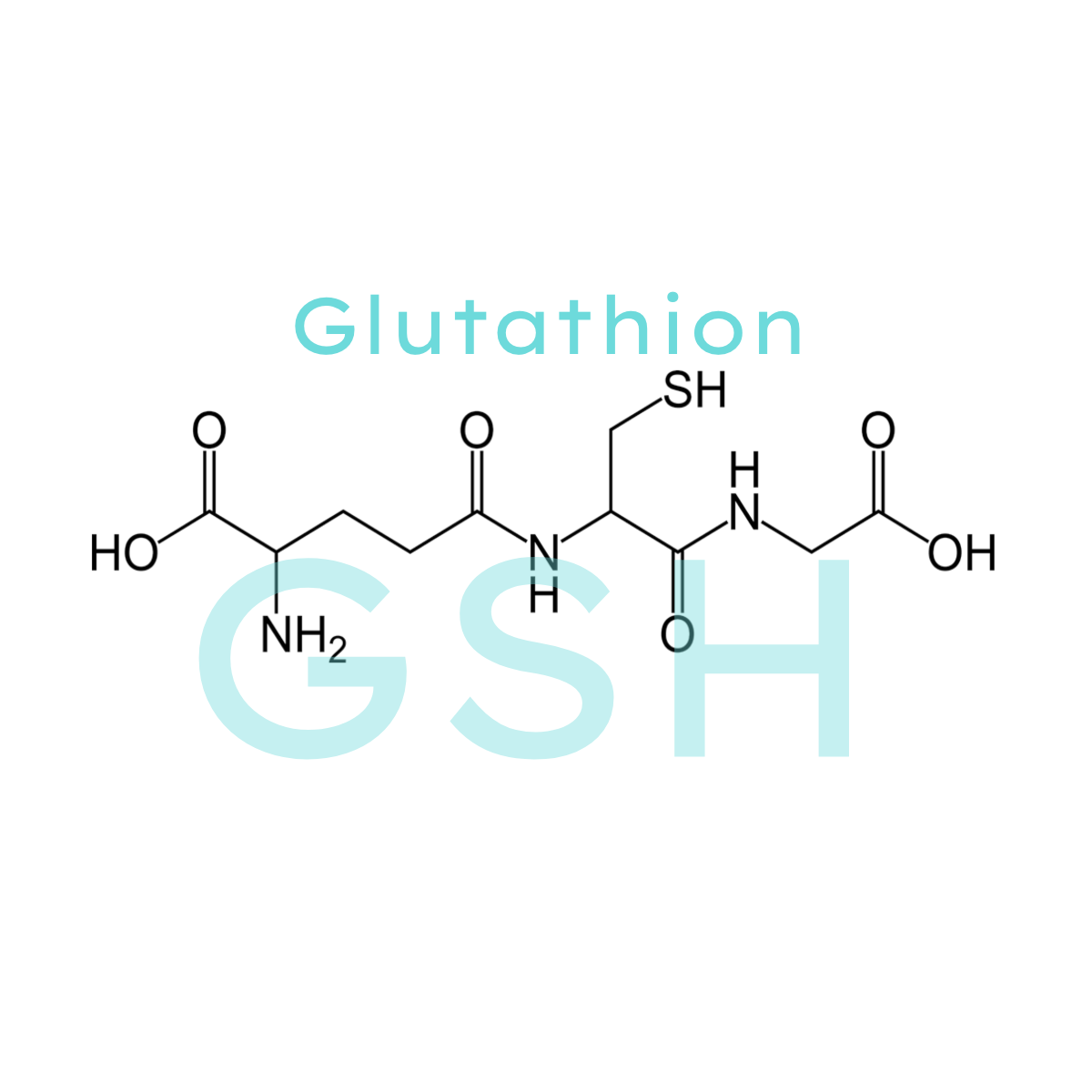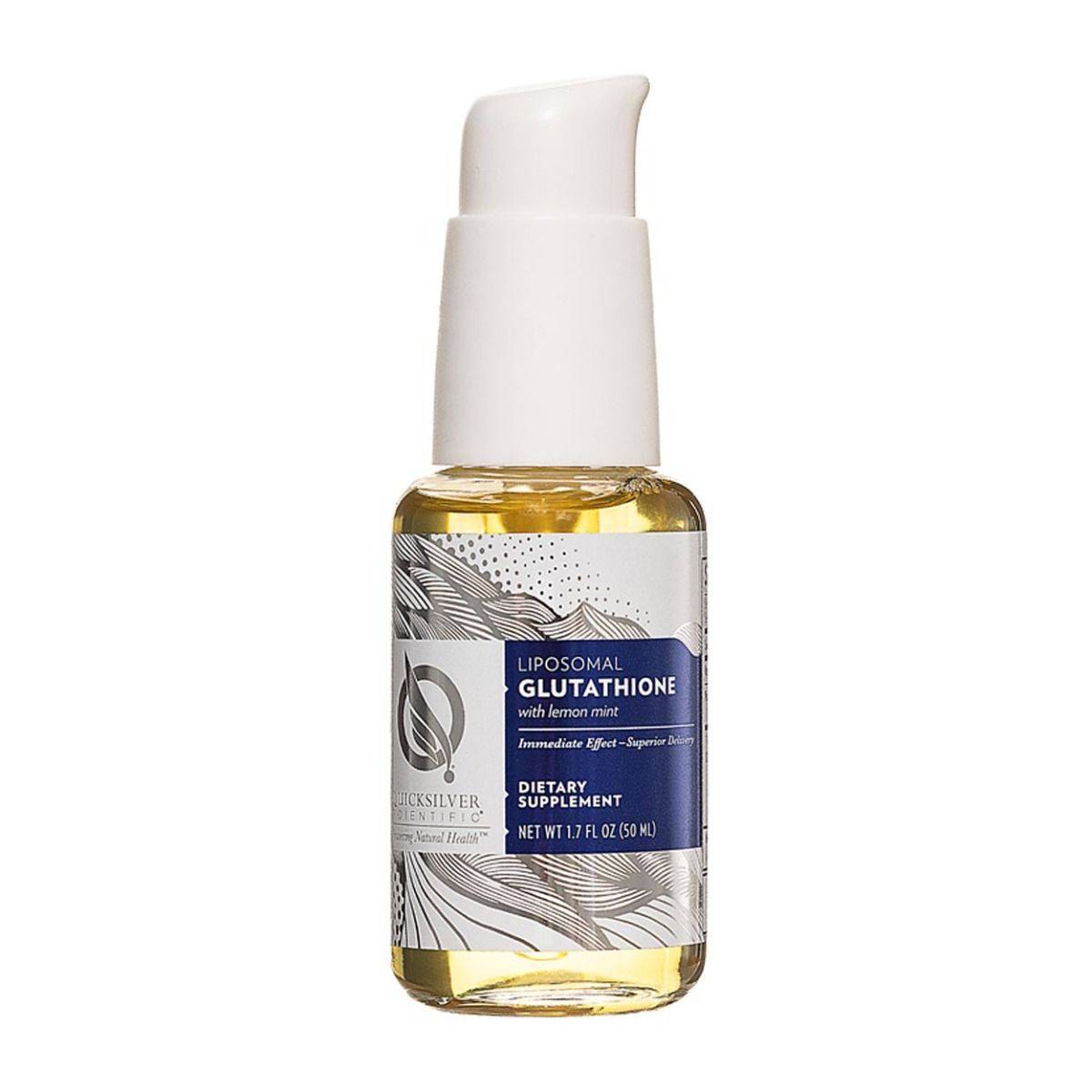Liposomal glutathione

Glutathione is the body’s most important antioxidant in every cell.
It is also called a “master antioxidant” because it exerts its effects on cells and unique ability to maximize the impact of all other antioxidants.
Quicksilver Scientific Liposomal Glutathione 1.7oz
For cellular regeneration all over the body
Glutathione is the body’s most important antioxidant, found in every single cell.
It is also called a “master antioxidant” because it exerts its effects within cells and its unique ability to maximize the effects of all other antioxidants, including vitamins C and E, Q10 + Ubiquinol, alpha-lipoic acid.
Glutathione
The primary function of Glutathione is to protect cells and mitochondria from the damaging, destructive effects of internal oxidation processes [1]. It covers the integrity of our cells, tissues, and organs, thus playing an essential role in the fight against chronic diseases associated with aging.
Glutathione is key to detoxification, neutralizing toxins in the body, and protecting against the harmful effects of radiation, chemicals, and environmental contaminants.
It improves the functioning of the immune system, has a nervous system protection effect, increases the body’s resistance to infections, can speed up the recovery from diseases, and increases the body’s energy levels and vitality [2].
Why you should keep the glutathione level high?
To achieve optimal health and longevity, the body’s glutathione levels should be kept high [3]. Glutathione levels are significantly reduced by diseases, infections, stress, malnutrition, environmental pollution, poisoning, and aging.
Deficiency of this master antioxidant has been linked to several diseases: immune system disorders, nervous system problems, autoimmune processes, lack of energy, impaired detoxification function, muscle weakness, inflammatory conditions, and cellular malignancies [4].
GSH is a critical component of our antioxidant defense system. This molecule is made up of three amino acids (cysteine, glutamic acid, glycine) that are produced in small amounts by our body. Still, in many cases, our body needs replacement.
Contrary to popular belief, it can be demonstrated that during oral administration of the molecule, it is not degraded in the acidic medium of the stomach but is absorbed from the intestinal tract into the bloodstream and reaches the cells [5].
The liver contains a large amount of Glutathione, which shows its important role in the body’s detoxification processes. Low glutathione levels are present in many chronic diseases and weakened immune systems, so the elderly, physically and mentally stressed people, and the weakened immune system need Glutathione!
Benefits of Glutathione
- Cellular energy supply
- For optimal functioning of the immune system, to promote effective inflammation reduction.
- Control of various infections
- Prevention of malicious processes. Increase the energy supply at the cellular level to balance the mitochondria and reduce the harmful effects of oxidative stress
- Support of the nervous system
- Adjunctive treatment of autoimmune conditions (e.g., Hashimoto)
- In the adjunctive treatment of gynecological problems such as endometriosis, fibroids
Immunological effects
- For a healthy immune system, protection against infections and autoimmune processes. Glutathione plays a vital role in maintaining the healthy functioning of the immune system.
- Oxidative stress caused by viral infections causes inflammation in the cells, and glutathione levels are demonstrably reduced.
- Decreased immunity and an increased risk of infections are associated with low glutathione levels [6]. Glutathione is beneficial in increasing the number of T cells in immune leukocytes and NK cells in natural killer cells [7].
- Glutathione deficiency can be detected in autoimmune diseases. Research has shown that Glutathione has a positive effect on the normal functioning of the immune system and prevents the development of an immune response and inflammation in autoimmune diseases [8].
Detoxification
- Oxidation is healthy to some extent (e.g., sports). However, excessive oxidation is already harmful. This can be caused by unhealthy lifestyles, stress, malnutrition, and external environmental toxins.
- The antioxidant system of a healthy young body seeks to protect it from external and internal oxidative effects to prevent tissue wear and tear, thus slowing the aging process so that our cells can remain young and healthy for a long time.
- It is important for recycling other antioxidants, such as vitamins C and E and Q10+ Ubiquinol.
- Glutathione is found in the highest concentrations in the liver and kidneys. [9].Helps remove toxins, foreign chemicals, potential carcinogens, hormones, and pollutants. It converts them into water-soluble substances that can now be easily excreted from the body through the kidneys.
- Promoting the detoxifying processes of the liver
- The detoxification ability of Glutathione can be further enhanced by other sulfur-containing molecules: cruciferous plants (broccoli), r-alpha-lipoic acid, N-acetyl cysteine, turmeric, St. John’s wort, and B vitamins, selenium.
- This molecule is also present in the entire intestinal mucosa, where it traps and neutralizes potential toxins before they are absorbed into the body. It protects the intestinal wall, which, if weakened, can lead to a leaking / permeable intestinal problem [10].
Other benefits
- Protecting the brain and nervous system: Our brain uses a lot of oxygen and is highly vulnerable to oxidative damage. This oxidative damage adversely affects neurological functions and development, leading to mitochondrial dysfunction and several neurodegenerative diseases. Glutathione protects brain cells against oxidation. Low glutathione levels increase the risk of developing neurodegenerative diseases [11].
- Heavy metals accumulate in the brain and can cause severe oxidative stress and cell damage. Glutathione can detoxify toxic metals in the brain, thereby protecting the health of the nervous system.
- Energy production of cells, enhancement of vitality
- Mitochondria are responsible for our cells’ energy production in the form of adenosine triphosphate (ATP), the body’s fuel. The function of mitochondria also plays a vital role in cell health, intercellular communication, regulated cell death, and cell growth. Glutathione can potentially improve mitochondrial health and affect our energy-producing abilities [12].
- Glutathione can help to disappear gray hair and restores the original hair color (13)
- A small study published in Medical Science Monitor in 2011 shows a connection between low glutathione levels and autism spectrum disorders. (14, 15)
Resources
- [1] Aldini G, Altomare A, Baron G, Vistoli G, Carini M, Borsani L, Sergio F. N-Acetylcysteine as an antioxidant and disulphide breaking agent: the reasons why. Free Radic Res. 2018 Jul;52(7):751-762
- [2] Samuni Y, Goldstein S, Dean OM, Berk M. The chemistry and biological activities of N-acetylcysteine. Biochim Biophys Acta. 2013 Aug;1830(8):4117-29.
- [3] Fulghesu AM, Ciampelli M, Muzj G, et al. N-acetyl-cysteine treatment improves insulin sensitivity in women with polycystic ovary syndrome. Fertil Steril. 2002 Jun;77(6):1128-35.
- [4] Safarinejad MR, Safarinejad S. Efficacy of selenium and/or N-acetyl-cysteine for improving semen parameters in infertile men: a double-blind, placebo controlled, randomized study. J Urol. 2009 Feb;181(2):741-51.
- [5] Badawy A, State O, Abdelgawad S. N-Acetyl cysteine and clomiphene citrate for induction of ovulation in polycystic ovary syndrome: a cross-over trial. Acta Obstet Gynecol Scand. 2007;86(2):218-22.
- [6] Porpora MG, Brunelli R, Costa G, Imperiale L, Krasnowska EK, Lundeberg T, Nofroni I, Piccioni MG, Pittaluga E, Ticino A, Parasassi T. A promise in the treatment of endometriosis: an observational cohort study on ovarian endometrioma reduction by N-acetylcysteine. Evid Based Complement Alternat Med. 2013;2013:240702.
- [7] Stey C, Steurer J, Bachmann S, Medici TC, Tramèr MR. The effect of oral N-acetylcysteine in chronic bronchitis: a quantitative systematic review. Eur Respir J. 2000 Aug;16(2):253-62.
- [8] Stav D, Raz M. Effect of N-acetyl cysteine on air trapping in COPD: a randomized placebo-controlled study. Chest. 2009 Aug;136(2):381-6.
- [9] Mokhtari V, Afsharian P, Shahhoseini M, Kalantar SM, Moini A. A Review on Various Uses of N-Acetyl Cysteine. Cell J. 2017;19(1):11-17. doi:10.22074/cellj.2016.4872
- [10] Sandhir R, Sood A, Mehrotra A, Kamboj SS. N-Acetylcysteine reverses mitochondrial dysfunctions and behavioral abnormalities in 3-nitropropionic acid-induced Huntington’s disease. Neurodegener Dis. 2012;9(3):145-57.
- [11] Shungu DC. N-acetylcysteine for the treatment of glutathione deficiency and oxidative stress in schizophrenia. Biol Psychiatry. 2012 Jun 1;71(11):937-8.


